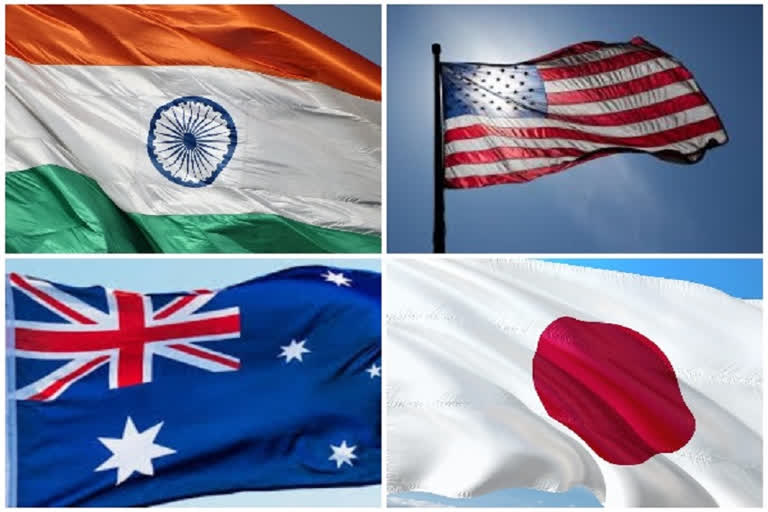New Delhi: Ahead of a meeting of Foreign ministers from India, Japan Australia and the US which is expected to be held in October in Tokyo, Senior officials from the Ministry of External Affairs of India, Department of Foreign Affairs & Trade of Australia, Ministry of Foreign Affairs of Japan and Department of State of the United States of America held a video conference on Friday for consultations on regional and global issues of common interest.
The officials reaffirmed their commitment towards a free, open, prosperous and inclusive Indo-Pacific region based on shared values and principles and respect for international law.
Widely viewed as a grouping aiming to contain China, the Quad had last met at the official level in November 2019 and at the Ministerial level in September last year.
Recalling those interactions held earlier, the officials exchanged views on ongoing and proposed practical cooperation in the areas of connectivity and infrastructure development, and security matters, including counter-terrorism, cyber and maritime security.
The group specifically noted that the objective is to promote peace, security, stability and prosperity in the Indo-Pacific region.
It is pertinent to note that China's territorial claims in the South China Sea and its efforts to advance into the Indian Ocean are seen to have challenged the established rules-based system. Indian-Pacific region is largely viewed as an area comprising the Indian Ocean and the western and central Pacific Ocean, including the South China Sea.
In the context of the ongoing COVID-19 global pandemic, the officials during the consultations also underscored the importance of enhancing the resilience of supply chains and sharing best practices on how to combat the pandemic.
The officials reiterated their firm support for ASEAN-Centrality and ASEAN-led mechanisms particularly the leaders-led East Asia Summit, in the regional architecture for the Indo-Pacific, and their readiness to work with ASEAN and all other countries towards realizing a common and promising vision for the Indo-Pacific.
They appreciated the Vietnamese chairmanship of the ASEAN and looked forward to the 15th East Asia Summit in November this year. The quad officials looked forward to the Ministerial consultations to be held later this year.
Earlier this week, US State Department said that Washington’s growing security a diplomatic relation with New Delhi is vital to open a free, open and inclusive Indian-Pacific region.
"The pace and scope of the India partnership continue to expand! Whether it's at @UN or with Quad partners, our growing security and diplomatic cooperation with India is vital to a free, open, and inclusive #IndoPacific," tweeted State Department for the Bureau of South and Central Asian Affairs (SCA) on Wednesday.
While speaking to ETV Bharat, former ambassador, JK Tripathi said, “The ‘quad’ meeting is a joint attempt of India-US-Australia-Japan to contain China’s growing ambitions of regional expansions and to contain China’s ‘String of Pearls’ in the Indian Ocean region. By the design of ‘String of Pearls’, China wanted to have the presence of its Navy at many points in and around Indo-Pacific so that it can encircle India with ‘string of pearls’ and many bases. That was the attempt why China wanted to have a base in Sri Lanka, Bangladesh, Myanmar, South China. China already has a base in Djibouti. Therefore, in an attempt to counter China’s growing influence in the area, four nations entered into ‘Quad’ which is crucial."
“Had there not been Chinese attempt to create hegemony in the Indo-Pacific region, ‘Quad’ would not have done initiated such a step. Certainly, the quad meeting will help to counter China because Australia has a major strategic presence and Japan is quite close to China”, he reiterated.
Tripathi further pointed out that in terms of India and US, it is a ‘win-win’ situation because, in the Indo- Pacific region, US requires India as much as India does especially when the US has its military base in Wuhan which is considered important in the Pacific Ocean. “Thus, it is an overall exercise to safeguard the sea trade routes of India and the US from China. It will help Chinese design to stop and coerce the trade routes used by the quad nations”, he said.
Also Read: India, Israel establish sub working group on defence industrial cooperation



